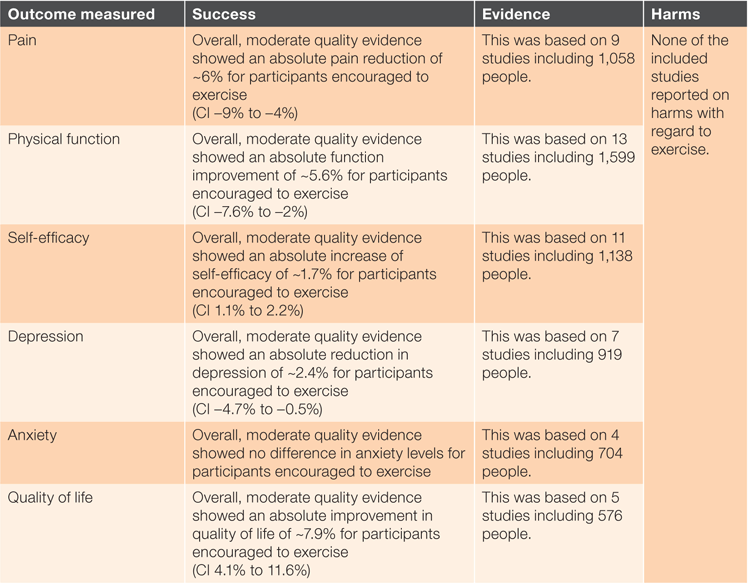Patients with osteoarthritis need reassurance that exercise will improve their condition
Vanessa Jordan1 New Zealand Cochrane Fellow, University of Auckland, Auckland, New Zealand
Correspondence to: Vanessa Jordan. Email: Vanessa Jordan v.jordan@auckland.ac.nz
Journal of Primary Health Care 10(2) 181-182 https://doi.org/10.1071/HC15935
Published: 28 June 2018
Journal Compilation © Royal New Zealand College of General Practitioners 2018.
This is an open access article licensed under a Creative Commons Attribution-NonCommercial-NoDerivatives 4.0 International License.
COCHRANE REVIEW: Hurley M, Dickson K, Hallett R, Grant R, Hauari H, Walsh N, Stansfield C, Oliver S. Exercise interventions and patient beliefs for people with hip, knee or hip and knee osteoarthritis: a mixed methods review. Cochrane Database of Systematic Reviews 2018, Issue 4. Art. No. CD010842. doi:10.1002/14651858.CD010842.pub2.
THE PROBLEM: Osteoarthritis (OA) is a prevalent and debilitating condition affecting over 20% of the population over 50 years of age.1 Approximately 15% of people over the age of 50 will consult their general practitioner (GP) with regard to knee pain annually.1 This Cochrane review not only set out to determine if exercise was beneficial for this population but also incorporated qualitative information about how patients perceived their condition and their beliefs on the best treatments.2
CLINICAL BOTTOM LINE: Evidence showed that sufferers of OA may avoid activity for fear of causing further harm. Patients with OA also expressed some pessimism about the possibility of exercise helping when the damage was already done. This review has shown that participation in exercise programs may slightly improve physical function, pain, depression and quality of life. GPs should encourage sufferers of OA to participate in exercise programmes and reassure patients that this will not harm them.2

|
References
[1] Jinks C, et al. A brief screening tool for knee pain in primary care (KNEST). 2. Results from a survey in the general population aged 50 and over. Rheumatology (Oxford) 2004; 43 55–61.| A brief screening tool for knee pain in primary care (KNEST). 2. Results from a survey in the general population aged 50 and over.Crossref | GoogleScholarGoogle Scholar |
[2] Hurley, M., et al. Exercise interventions and patient beliefs for people with hip, knee or hip and knee osteoarthritis: a mixed methods review. Cochrane Database of Systematic Reviews, 2018(4).


